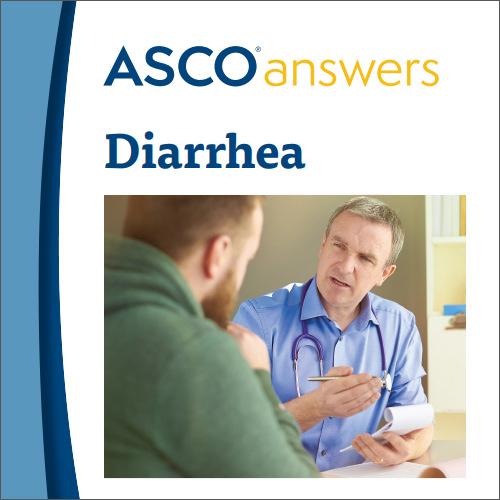Diarrhea is frequent, loose, or watery bowel movements. Bowel movements are also called stools.
Although mild diarrhea can be unpleasant, it usually does not cause serious health problems. But severe diarrhea can cause dehydration and electrolyte imbalances. This happens when your body loses too much water and important minerals.
If you have diarrhea during cancer treatment, ask your health care team how to manage it. Talk openly about it with them. If they know about the problem, they can help you. Relieving your side effects is an important part of cancer care and treatment. This is called palliative care or supportive care.
What causes diarrhea during cancer treatment?
Diarrhea is often a side effect of cancer treatment. Common causes of diarrhea during cancer treatment include:
-
Chemotherapy
-
Immunotherapy
-
Targeted therapy
-
Radiation therapy to the pelvis
-
Surgical removal of a part of the bowel
-
Graft-versus-host disease, a side effect of bone marrow/stem cell transplantation
Diarrhea can also be a symptom of the cancer itself. Cancer that affects the pancreas, colorectal cancer, and neuroendocrine tumors in the gastrointestinal (GI) tract can all cause diarrhea.
Conditions and medication not related to cancer can also cause diarrhea. These include:
-
Irritable or inflammatory bowel disease
-
Viral infection
-
Not being able to digest certain foods
-
Infection with Clostridium difficile, a bacteria also known as C. diff that causes diarrhea
-
Infection with other bacteria
-
Antibiotics
Your health care team may do medical tests to find out why you have diarrhea.
Grades of diarrhea
To understand how severe your diarrhea is, doctors use a grade system set by the National Cancer Institute. This system uses your bowel movement baseline. The number of bowel movements you usually have in a day is your "baseline." When you have diarrhea, you have more bowel movements than your baseline. Diarrhea does not necessarily have to be watery stools. Increased frequency of stools from your baseline is also considered diarrhea. Knowing the grade of your diarrhea can help determine the right treatment for you.
Grade 1. Passing up to 4 more stools a day than your baseline.
Grade 2. Passing 4 to 6 more stools a day than your baseline.
Grade 3. Passing 7 or more stools a day than your baseline. Grade 3 diarrhea may need treatment in a hospital or clinic. People with grade 3 diarrhea cannot control their bowel movements and have trouble meeting daily needs without help.
Grade 4. This is a life-threatening condition. You need medical care right away.
How can diarrhea be prevented or treated?
There are steps you can take to prevent diarrhea or treat it before it causes other problems. Your treatment options depend on your symptoms and the cause of diarrhea.
Ask your health care team about medicine you can take to prevent diarrhea. These include loperamide (Imodium) as well as a combination of diphenoxylate and atropine (Lomotil). You may receive these to prevent diarrhea caused by chemotherapy.
Researchers are studying drugs for diarrhea caused by radiation therapy to the pelvic area. But the U.S. Food and Drug Administration has not approved these drugs yet.
Sometimes, the pancreas not working well can cause diarrhea. This happens to some people with pancreatic cancer. If that is the case, replacing pancreatic enzymes that help digest food can help and may be a treatment option.
If you have mild diarrhea, consider these options to help manage it:
-
Avoid caffeine, alcohol, dairy, fat, fiber, orange juice, prune juice, and spicy foods.
-
Avoid medication such as laxatives, stool softeners, and metoclopramide (Reglan). Sometimes, doctors prescribe metoclopramide to prevent nausea and vomiting from chemotherapy.
-
Eat small meals. Choose foods that are easy to digest. These include bananas, rice, applesauce, and toast. If chemotherapy is causing diarrhea, your doctor may recommend a low-residue diet. When you eat a low-residue diet, your body makes less stool. It includes low-fiber foods.
-
Drink water and other clear liquids to prevent dehydration.
If you have severe diarrhea or mild diarrhea that does not improve, tell your health care team. Depending on your symptoms, your doctor may:
-
Change your diarrhea medication
-
Check your electrolytes level
-
Give you fluids through an intravenous (IV) line that goes in a vein in your arm
-
Check for an infection
-
Change the schedule or dose of chemotherapy
Questions to ask the health care team
Consider asking your health care team these questions about diarrhea.
-
Is diarrhea a possible side effect of any of the medications I will be taking or the cancer treatments I will receive?
-
Can the cancer itself cause diarrhea?
-
Who should I tell if I experience a change in my bowel movements during cancer treatment?
-
Are there things I can try at home if I have mild diarrhea?
-
What are signs that diarrhea has become severe?
-
What should I do if I experience severe diarrhea?
-
Should I keep track of my bowel movements and diarrhea during cancer treatment? If so, how should I track my symptoms?
Related Resources
Side Effects of Radiation Therapy
Side Effects of Bone Marrow Transplantation

